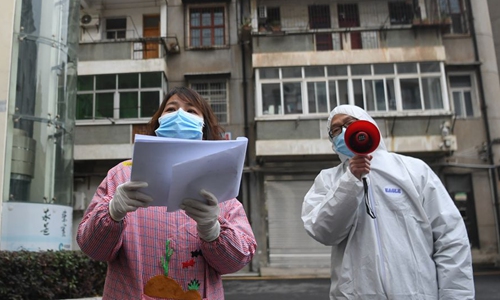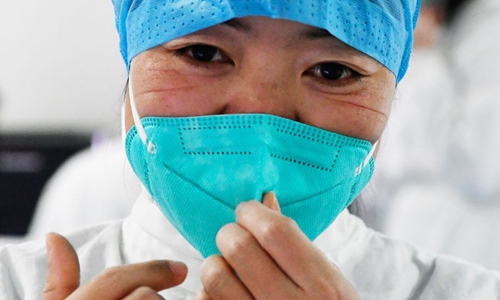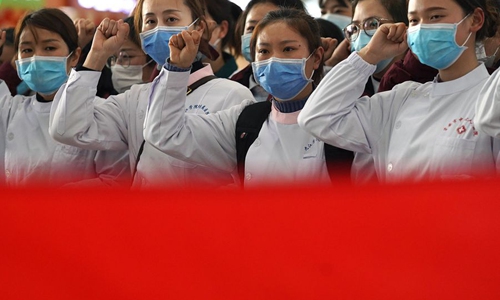HOME >> CHINA
Coronavirus battle promotes gender equality in China
By Huang Lanlan Source:Global Times Published: 2020/2/20 1:15:09

A female community worker (L) and her colleague learn about residents' situation in Caidian District of Wuhan, the epicenter of the novel coronavirus outbreak, in central China's Hubei Province, Feb. 7, 2020. (Xinhua/Cheng Min)
Chinese netizens were enraged by a recent government notice in Jinan, East China’s Shandong Province, which called on the city’s women to look after children at home during the COVID-19 outbreak.
“As the new semester is postponed due to the epidemic, we suggest working mothers of underage students stay at home to take care of them,” local news website dzwww.com reported Monday, citing the Jinan education authority.
Netizens criticized the suggestion as gender biased, which implied women instead of men should be the ones to stay at home even if they have jobs.
The notice seemed inappropriate, particularly while fighting against the epidemic. Numerous medical staffers nationwide are busy treating COVID-19 pneumonia patients, and the majority of them are reportedly females.
“Ask women to look after kids at home? Sorry, they are saving lives on the frontline,” wrote a Weibo user called Yuzhimei.

Marks caused by masks are seen on the face of a female medical worker at Fuzhou Pulmonary Hospital of Fujian in Fuzhou, southeast China's Fujian Province, Jan. 31, 2020. (Photo by Wang Yi/Xinhua)
Female contribution
More than 90 percent of the nurses and over half of the doctors that Shanghai has sent to support Wuhan in Central China’s Hubei Province, epicenter of the epidemic, are females, according to statistics from Shanghai Women’s Federation.
In Shandong Province, where the controversial notice was sent out, females account for nearly 60 percent of its 1,385 medical staffers assisting Wuhan hospitals, the local women’s federation said.
Their efforts and dedication deserve to be seen, said Jiang Jinjing, a volunteer who initiated a menstrual hygiene item donation program for medical personnel in Wuhan. “The frontline female doctors and nurses I’ve talked to impressed me a lot,” she told the Global Times. “They are brave and hardworking, no less than their male peers.”
Women contribute in various aspects apart from the medical system. In Shanghai’s Daning Road subdistrict, where over 90,000 residents live, 133 of the 172 staffers who directly participate in virus prevention and control are females, said the subdistrict deputy director Yang Rong.
“Most of us have been working for over 20 consecutive days, busy with epidemic knowledge publicity, resident information collection and mask distribution,” she told the Global Times. “We females play an important role in the war against the virus.”
Women are active even on construction sites. Huoshenshan and Leishenshan, two makeshift hospitals in Wuhan specifically designed for the epidemic, were built within days under the efforts of both male and female workers.
Photos of female construction workers at the two hospitals pushing carts and carrying heavy building materials have won lots of praise on Chinese social media. “They are modern-day versions of Mulan, strong and beautiful,” a Weibo user Yuweilu commented.
It’s good to see that through the epidemic, many people realize that women can actually engage in almost all kinds of work, including the ones that used to be male-dominated, said feminist Ji Ming.
“They start to rethink females’ contribution to society and think, ‘oh, women can do much more than I thought,’” he told the Global Times.

Female health workers of a 101-member medical care team swear an oath before setting off for central China's Hubei Province to combat the novel coronavirus pneumonia, in Nanchang, east China's Jiangxi Province, Feb. 4, 2020. (Xinhua/Wan Xiang)
Family role
People are also rethinking women’s contribution to the family amid the virus outbreak, observers said.
“Many Chinese women are engaged a lot more than their spouses in domestic chores like cooking and looking after children, but their dedication and sacrifices are seldom noticed,” Chen Yaya, a research fellow at the Shanghai Academy of Social Sciences, told the Global Times.
Wen Ye, a 35-year-old internet company staffer who hasn’t received a work resumption notice from his employer, is currently the only one in his family with free time to do cooking, laundry and cleaning as his wife has started working from home.
“I never thought housework was so difficult to deal with,” Wen said. “It has made me exhausted these days.”
Many couples like Wen and his wife have been staying at home as the government has suggested citizens go through a self-imposed quarantine of two weeks to reduce the risks of virus infection and transmission.
The days at home have got many adult Chinese men – who used to spend most of their time on work instead of family – more involved in housework.
Topics about men doing housework during the quarantine have generated heated discussion on social media. There have been nearly 70,000 posts with the hashtag “men buying vegetables” on Twitter-like Weibo as of Wednesday, which have been read 580 million times in total.
Many of the posts laughed at men’s clumsiness in family chores like grocery shopping. One Weibo user wrote her husband had no idea what the color of an onion is. Another wrote she asked her husband to buy a bottle of light soy sauce and he later brought home a bottle of dark soy sauce.
“I used to think housework doesn’t take much time and energy,” Wen said. “But now I truly appreciate my wife for all the things she has done for our family. She’s great and respectable.”
Open a window
To some extent, the epidemic indirectly breaks the current gender stereotype in Chinese society, which is the positive side, Chen said.
“But in the long term, there should be more changes to the gendered division of household labor,” she said, adding that many Chinese women are doing unpaid housework.
Nonetheless, the fight against the virus is opening a window to a more gender-equal society, where women’s needs, including their rarely mentioned menstrual needs, are heard by the public.
The China Women’s Development Foundation, a foundation under the All-China Women’s Federation, has donated nearly 40,000 packs of pads and tampons to the female medical staffers in Wuhan, Xinhua News Agency reported Tuesday. Topics related to the donation have been viewed 380 million times on Weibo.
“Our society is a normal, safe and warm one only when we can frankly talk about the menstrual needs of the frontline females,” commented people.cn, the official website of People’s Daily, on Tuesday.
Citing Mao Zedong, it said that women hold up half the sky in fighting against the epidemic.
“How a nation respects and cares for females measures its degree of civilization,” it added.
Posted in: SOCIETY